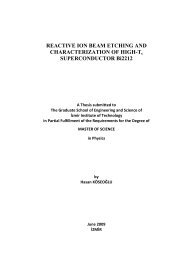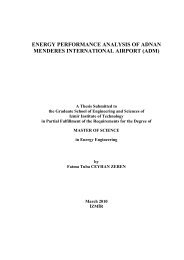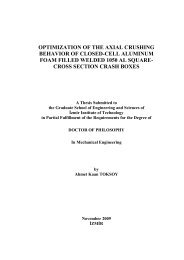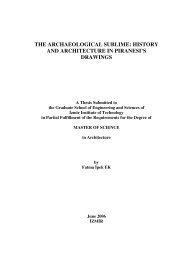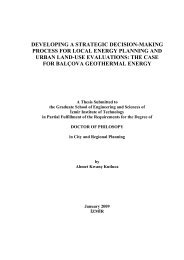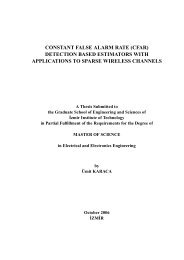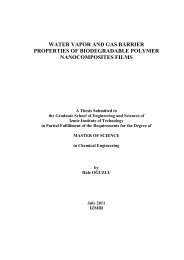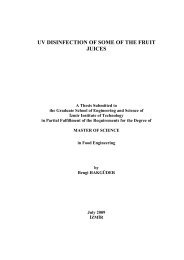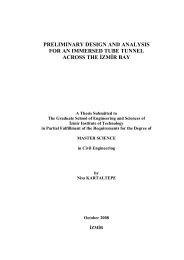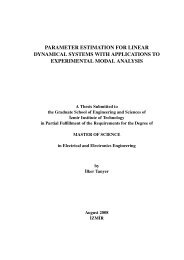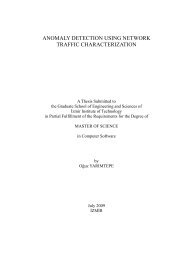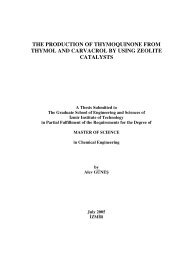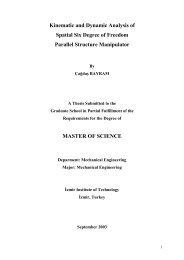a critical evaluation on the concept of justice in planning process
a critical evaluation on the concept of justice in planning process
a critical evaluation on the concept of justice in planning process
You also want an ePaper? Increase the reach of your titles
YUMPU automatically turns print PDFs into web optimized ePapers that Google loves.
2.4.3. Liberties and Rights <strong>in</strong> <strong>the</strong> Development Process <strong>of</strong> Liberal Rule<br />
<strong>of</strong> Law First Stage Rights: Individuals’ Liberties and Political Rights<br />
These rights at first came out as <strong>the</strong> rights provid<strong>in</strong>g <strong>the</strong> security and aut<strong>on</strong>omy<br />
<strong>of</strong> <strong>in</strong>dividuals <strong>in</strong> fr<strong>on</strong>t <strong>of</strong> government and o<strong>the</strong>rs. Today, however, <strong>the</strong>y reached to a<br />
state where <strong>in</strong>dividuals choose <strong>the</strong> c<strong>on</strong>diti<strong>on</strong>s <strong>of</strong> <strong>the</strong>ir own future and improve<br />
<strong>the</strong>mselves. Rights and liberties with<strong>in</strong> this scope are; thought freedom, freedom <strong>of</strong><br />
assembly and associati<strong>on</strong> and rights <strong>of</strong> participati<strong>on</strong>. Start<strong>in</strong>g <strong>of</strong> “liberty <strong>of</strong> <strong>in</strong>dividuals<br />
and political rights” which are called as “classic” or “basic” today bases <strong>on</strong> c<strong>on</strong>flicts<br />
between aristocracy and bourgeois. With <strong>the</strong>ir classical mean<strong>in</strong>g rights and liberties <strong>the</strong>y<br />
have a classificati<strong>on</strong>al property because it was born from <strong>the</strong> struggle <strong>of</strong> bourgeoisie and<br />
feudality and it represents classic-liberal liberty which also represents <strong>the</strong> benefits <strong>of</strong><br />
bourgeoisie. Even though <strong>the</strong> thought and historical sources <strong>of</strong> human rights goes even<br />
fur<strong>the</strong>r <strong>in</strong> <strong>the</strong> past, with <strong>the</strong> “<strong>the</strong> <strong>in</strong>dividualistic doctr<strong>in</strong>e” and “natural law” 22 trends born<br />
<strong>in</strong> 17 th and 18 th centuries established <strong>the</strong> <strong>the</strong>oretical data <strong>of</strong> traditi<strong>on</strong>al liberties’<br />
formulati<strong>on</strong>s (Kabo lu, 2002, 41-42).<br />
Kabo lu c<strong>on</strong>siders <strong>the</strong> basic <strong>of</strong> first stage “<strong>in</strong>dividuals’ liberty and political rights” as<br />
liberal doctr<strong>in</strong>e. Liberalism as an <strong>in</strong>dividualistic approach gives priority to <strong>in</strong>dividuals<br />
<strong>in</strong> fr<strong>on</strong>t <strong>of</strong> <strong>the</strong> society; a thought <strong>of</strong> <strong>in</strong>dividuals as first merit <strong>in</strong> society even as <strong>the</strong> aim<br />
<strong>of</strong> social organizati<strong>on</strong> and develops <strong>on</strong> <strong>the</strong> basis <strong>of</strong> show<strong>in</strong>g respect to <strong>in</strong>dividualistic<br />
entrepreneurship and preferences. Society is necessary for <strong>the</strong> improvement <strong>of</strong><br />
<strong>in</strong>dividuals however is sec<strong>on</strong>dary and just a “tool”. Individual <strong>on</strong> <strong>the</strong> o<strong>the</strong>r hand is <strong>the</strong><br />
owner <strong>of</strong> rights. Order <strong>of</strong> state-society and <strong>in</strong>dividual is like <strong>in</strong>dividual-society-state”<br />
(Kabo lu, 2002, 268-267).<br />
Specificity <strong>of</strong> first stage human rights is that people are born free and equal and<br />
that people are born free and equal and that <strong>the</strong> political power orig<strong>in</strong>s from <strong>the</strong>m and so<br />
it determ<strong>in</strong>es what <strong>the</strong>se people who are entrusted, cannot do. Everybody can benefit<br />
from <strong>the</strong>se rights and liberties which <strong>the</strong>ir realizati<strong>on</strong> depends <strong>on</strong> <strong>the</strong> political power not<br />
<strong>in</strong>terfer<strong>in</strong>g <strong>the</strong>m accord<strong>in</strong>g to <strong>the</strong>ir abilities.<br />
22 In natural law approach <strong>the</strong> human nature has some properties like protect<strong>in</strong>g itself, motive to c<strong>on</strong>t<strong>in</strong>ue<br />
its species and natural rights. Rights to live, freedoms, search<strong>in</strong>g for happ<strong>in</strong>ess are am<strong>on</strong>g natural rights.<br />
These rights are not historical, <strong>in</strong> o<strong>the</strong>r words <strong>the</strong>y do not depend up<strong>on</strong> time and space and are organic<br />
parts <strong>of</strong> human be<strong>in</strong>g ( aylan, 1990; Cevizci, 1996, 157).<br />
37



